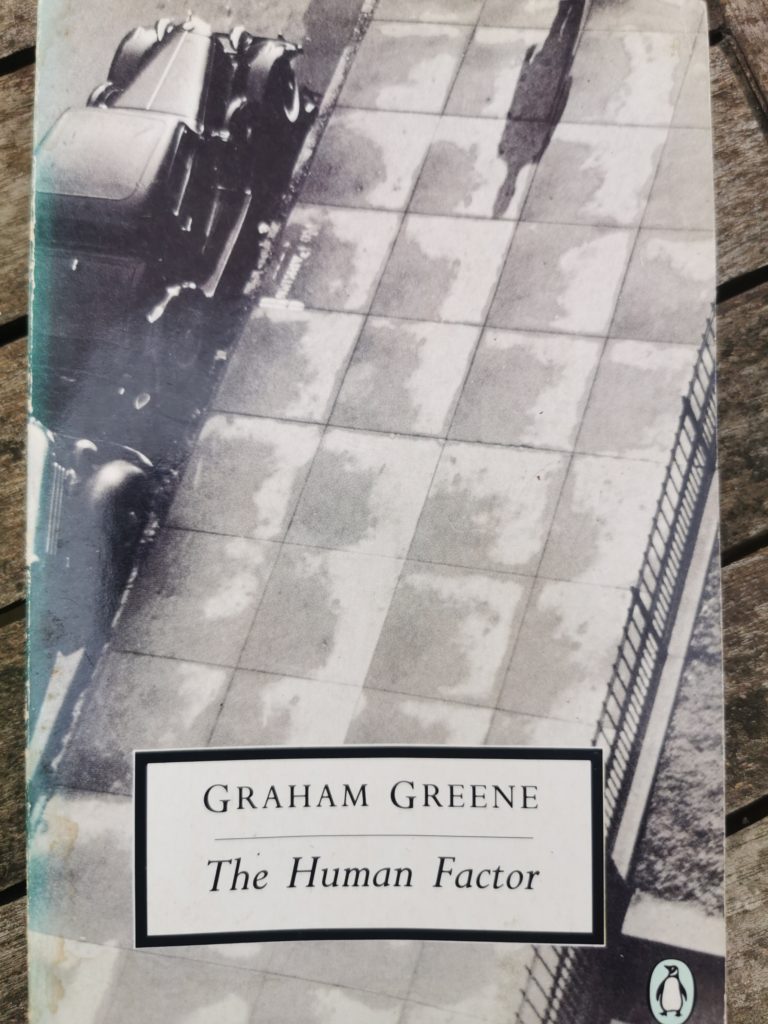“A crumb could contain a microdot.” (129)
The first Graham Greene book I read, Our Man in Havana (1958), followed the adventures of a vacuum cleaner salesman after being recruited by British Intelligence (and his increasingly outlandish ways of meeting their expectations). The Human Factor is decidedly less light-hearted, but no less a solid read.
Written 20 years later when Greene was in his 70s, he retains the power that keeps you turning pages (even when you want to make a cup of tea). Chapters end on cliffhangers, so do paragraphs. Dialogues exist to unmask character belief systems, prise out knowledge, and prime the protagonists for further action.
What is the human factor? It’s what makes us unpredictable. It’s what distinguishes us from machines and animals. Rationality paired with greed, fear mixed with love, decisiveness and clumsiness. Belief in a cause and the ability to let go of ideals when a situation demands it. Or the opposite: risking a comfortable status quo in pursuit of a dream. These dualities make us human. And in the business of spying they are weaknesses.
Maurice Castle works in London in the Africa section of MI6, Britains’s foreign intelligence service. MI5 is responsible for counter-intelligence, protecting British secrets and uncovering double agents. At the height of the cold war, the duties of the two agencies could overlap; when matters concerned Britain’s former colonies, MI5 weren’t always keen to handover responsibility. (A similar friction today can sometimes exist between the FBI and CIA).
As Greene makes clear, the situation in Africa post-World War 2 is complex, with many agencies, political groups and countries vying for control of resources and pondering alliances. Little has changed: think of the Congo today with its gold, Libya with its two governments, Sudan and its civil war and access to the Red Sea.
Castle previously worked in South Africa, responsible for monitoring the activities of other governments and recruiting foreign agents. He also found himself involved in resistance movements. And as so often happens when you do this, he fell in love. But by having a relationship with a Bantu woman, he broke the law. In apartheid South Africa, mixed-race relationships were illegal. With his mission in South Africa compromised, Castle had no choice but to sneak out of the country.

After escaping back to Europe with his wife and her son, Castle finds himself unnaturally detached from middle-class life. He views himself as an ‘honorary black’ (159). Under the South African Population Registration Act, an ‘honorary white’ referred to East Asians, granting privileges only available to white citizens. (I don’t think it included Indians.)
At first sight, Greene’s choice of the white saviour construction could be deemed passé. But the world of espionage is a man’s world, and the primal urges of men on overseas missions are amplified by the sense of dislocation. Maurice’s relationship with Sarah is no walk in the park. He frequently takes their dog Buller, a cat killer, for silent, contemplative strolls. While he hates the dog, Sarah doesn’t feel safe without the vicious boxer. She’s still coming to terms with her own traumas.
Although Sarah knows he’s a secret agent, Maurice is careful not to tell her anything she doesn’t need to know. But he resents not being able to talk about his day. (Not all spies were apparently so prudent. Guy Burgess had a tongue easily loosened by the application of alcohol, while John Vassall started working for the Soviets allegedly after falling into a honey trap).
Retirement is not an option
Castle is in his 60s and has one eye on retirement. However, this is not the case for his young colleague, Arthur Davis.
For Davis, life in the Africa section is far from the James Bond experience the young physics graduate envisaged. Although Davis spends his time drinking and on the town, Castle supervises him with a light touch. Davis take files out of the office to read during lunch, but to Castle this isn’t really an issue. After all, they only deal with Zaire, and news from the Congo drips in slowly at the London bureau.
But Castle’s light-touch becomes problematic when the unit suspects a leak. Davis is always late and goes to the dentist at short notice, even though he has good teeth. Or is the leak Castle’s superior, Watson? Other suspects include cold-hearted medical man Dr Percival. And they can’t rule out the pool of secretaries who type up the classified documents.
Greene drip-feeds the reader snippets of information in extensive dialogues. What start as ‘ordinary’ characters slowly break free from stereotypes of class, gender and race. Daintry hasn’t spoken to his wife in seven years and is only invited to his daughter’s wedding at the last moment. Dr Percival is only interested in fishing. The seemingly dissolute young Davis quotes the poetry of Robert Browning. In The Human Factor, there is less ‘character development’ and more ‘character revealing’.
Castle’s existential journey reflects Greene’s own experience. After extensive travels that took him through Africa, Mexico and Haiti, his sister Elisabeth enlisted him as an MI6 agent. Graham’s supervisor ultimately became the notorious Kim Philby, and the two apparently remained life-long friends despite Philby’s defection.
So you want to be a spy
When writing about paranoia, loneliness, and the desire for a ‘normal’ life, Greene undoubtably draws on personal experience and the acute observations he must have been constantly making about his colleagues. He saw first-hand the isolation, guardedness, detachment and ruthlessness that permeate the life of a spook.
What matters then is how the characters justify and live this life. Freshly minted Davis seeks stimulation, Colonel Daintry is jaded, Castle is a romantic and puts family and ideals first. Dr Percival is a pragmatist who does not allow human emotion to get in the way of duty. In this regard, Percival is a classic psychopath:
“I don’t think communism will work – in the long run – any better than Christianity has done, and I’m not the crusader type. Capitalism or communism? Perhaps God is a capitalist. I want to be on the side most likely to win during my lifetime…meanwhile I enjoy the game we’re all playing.” (163)
Reading Greene, you too will learn about the game. About microdots, book codes, techniques of persuasion, disguises, poisoning. Indeed, his attention to detail was so highly regarded that rival agencies were quick to read his work.
But the methods of espionage are not, in Greene’s hands, the heart of the matter (pun intended). The Human Factor is a psychological novel, concerned with insecurity and inner conflict:
“Why are some of us, he wondered, unable to love success or power or great beauty? Because we feel unworthy of them, because we feel more at home with failure…Perhaps one wanted the right balance, just as Christ had, that legendary figure whom he would have liked to believe in. ‘Come unto me all that travail and are heavy laden’.” (147)
After reading The Human Factor, I shall be loading myself up with more Graham Greene novels. These books are worthy time-fillers for anyone who likes suspense, storytelling and a good dose of self-examination.
